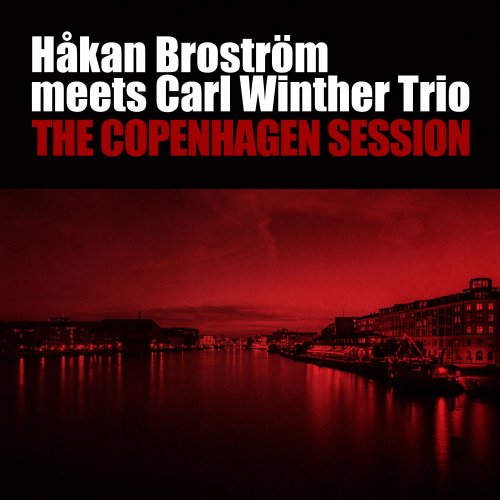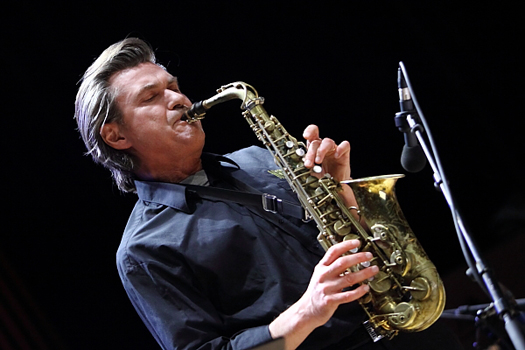Jazz interview with jazz saxophonist Håkan Broström. An interview by email in writing.
JazzBluesNews.com: – First, let’s start out with where you grew up, and what got you interested in music. How exactly did your adventure take off? When did you realize that this was a passion you could make a living out of?
Håkan Broström: – I grew up in Motala, a small town in Sweden. I was interested in music from the beginning. I think I was 3-4 years old and my first musical memory is Elvis Presley´s “Jailhouse Rock.” I started taking piano lessons when I was 9. I took up the saxophone at 15. First tenor and later alto. I fell in love with the saxophone at once, and when I was 18 or 19, I decided that I wanted to be a full-time musician.
JBN: – How has your sound evolved over time? What have you been doing to find and develop your own sound?
HB: – I have put in much time to get a sound that feels like me. I have always had a sound in my mind that I have been trying to realize in different ways, like long tones exercises and so on.
JBN: – What routine practices or exercises have you developed to maintain and improve your current musical proficiency in rhythm and harmony?
HB: – I have been practicing a lot of different things. Technique, of course, like scales and stuff, but also playing eight notes in different tempos to get the correct phrasing and time feel. I have also been doing some ear training to be able to play what I hear.
JBN: – Have you changed through the years? Any charges or overall evolution? And if so, why?
HB: – There has never been a point where I have decided to make a significant change in my playing. (Except switching from alto to tenor for a brief period.) But when I listen back, I notice there have been changes. The sound has changed, and the phrasing and even my musical overview. To the better I hope.
JBN: – How do you prepare for your recordings and performances to help you maintain both spiritual and musical stamina?
HB: – It is important for me to know what the music ” expects” from me and what I can expect from my fellow musicians. I can relax and concentrate on the music if I am comfortable with the context.
JBN: – What do you love most about your new album 2022: Håkan Broström Meets Carl Winther Trio – ”The Copenhagen Session” how it was formed, and what are you working on today?
HB: – I really love the vibe we created on the album. It has a live atmosphere, although it was a 100 % studio recording. Carl Winther Trio has a very high potential in playing hard-driving wild jazz but can also sound super sweet on a ballad. Right now, I am about to release an album with my big band, ”New Places Orchestra.” I just have to do the mastering and decide about the album cover.

JBN: – How did you select the musicians who play on the album?
HB: – In a way, you can say that they selected me. I was invited by the drummer, Anders Mogensen, to play at Odense Jazz Festival in Denmark. Anders had also booked a studio In Copenhagen the next day. We recorded something like 16-17 numbers in 4-5 hours.
JBN: – In your opinion, what’s the balance in music between intellect and soul?
HB: – Playing jazz, I think you need both intellect and soul, but if I had to choose between the two, I would choose soul. John Coltrane had the perfect balance between the two. Giant Steps was a super intellectual composition, and he also played blues better than everyone.
JBN: – There’s a two-way relationship between audience and artist; are you okay with delivering people the emotion they long for?
HB: – I am okay with that to a certain extent. When playing with my own projects, I usually prefer to play originals but sometimes I like to play standards that I know people are familiar with.
JBN: – Can you share any memories from gigs, jams, open acts and studio sessions over the years?
HB: – In 2010 I had the pleasure to play with Phil Woods in a project with Norrbotten Big Band. On one tune, Phil and I were trading eights. He played eight bars… I played eight bars and so on. At one point, I happened to play on the spot where Phil was supposed to play, and when I realized I was wrong, I kind of faded away, walking backward, and my phrases just faded out. People told me it looked hilarious.
JBN: – How can we get young people interested in jazz when most of standard tunes are half a century old?
HB: – Jazz will never reach a big audience again and I am perfectly okay with that. On the other hand, many musicians I play with are between 20 and 30 years old, and they know so many standards. There is no doubt that jazz will survive.
JBN: – John Coltrane once said that music was his spirit. How do you perceive the spirit and the meaning of life?
HB: – I think that there is a connection between everything. Thoughts and feelings will come through your instrument/voice if you are a serious musician. But in a very abstract way. It is hard to put it in words.
JBN: – If you could change one single thing in the musical world and that would become reality, what would that be?
HB: – Maybe that all the record stores open again, and people would start to buy CD:s and LP:s again.
JBN: – Whom do you find yourself listening to these days?
HB: – I listen to a lot of stuff. Often on YouTube. Some older things that I have missed with Sonny Rollins, Sonny Stitt, Cannonball and a lot early Keith Jarrett. I also listen to modern soul and R&B. Then I always listen to John Coltrane.
JBN: – What is the message you choose to bring through your music?
HB: – I don´t have a special message other than trying to play well and maybe put more focus on melodies . It is unusual today with nice themes. Many jazz people want to write hip stuff with complicated meters and harmonies and forget the impact of a strong melody.
JBN: – Let’s take a trip with a time machine: where and why would you really want to go?
HB: – I would like to go to a jazz club in 1962 and listen to John Coltrane Quartet. I think that it would be something that maybe can change your life.
JBN: – So far, it’s been me asking you questions, now may I have a question from yourself…
HB: – I would like to know what you think the optimal press kit should include.
I’m working on a new press kit and am curious to hear any recommendations.
JBN: – Perhaps more information about your progress in jazz, who you played with in the past years and biographical details, lots of photos and videos. Links to interviews, reviews, opinions about you.
For example, with your idea, which I raised as a title, I’m sorry, but I don’t quite agree. It’s true that electronic music and rap are very attractive to the youth today, but, for example, in the jazz festivals I organize in Eastern European countries, there is no shortage of spectators in large halls. I like your playing, next year, if you are not angry with me, I will invite you to perform, You will see for yourself!! Or, otherwise, what accounts for the 69,000+ views of my website every day? In direct marketing terms, your point is effective, that’s why I put it as a title.
JBN: – At the bottom line, what are your expectations from our interview?
HB: – That you are satisfied with the answers and that people who read it would find it interesting.
Interview by Simon Sargsyan







More Stories
Interview with Janis Siegel of The Manhattan Transfer: Jazz, being a more refined, interpreted form of music
CD review: George Benson – Dreams Do Come True: When George Benson Meets Robert Farnon – 2024: Video, CD cover
The band was tight as ever. The Warren Haynes Band cuts loose: Video, Photos